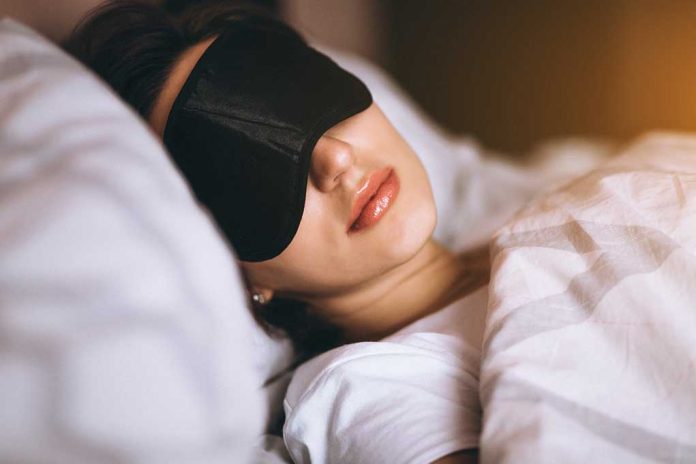
Hitting the snooze button costs Americans a full night’s sleep every month while wreaking havoc on their health, productivity, and mental clarity, according to alarming new research from 2025.
Key Takeaways
- Heavy snooze button users lose approximately 6 hours of quality sleep monthly, equivalent to a full night’s rest
- Snoozing disrupts critical REM sleep cycles, triggering fight-or-flight responses that increase heart rate and blood pressure
- Over 56% of Americans regularly use the snooze button, with heavy users averaging 20 minutes of fragmented sleep daily
- Repeated snoozing creates “sleep inertia” that can impair cognitive function for up to 4 hours after waking
- Setting your alarm for the latest possible time and maintaining consistent sleep schedules are better alternatives
The Hidden Cost of “Just Five More Minutes”
The seemingly innocent habit of hitting the snooze button is silently sabotaging America’s health and productivity. Groundbreaking 2025 research from Mass General Brigham analyzed over 3 million sleep sessions and found that 56% involved at least one instance of snoozing. Heavy users averaged 20 minutes of fragmented morning sleep daily, with each snooze session lasting approximately 11 minutes. This disrupted sleep pattern creates a cascade of negative effects that extend far beyond just feeling groggy in the morning.
Dr. Rebecca Robbins, a sleep researcher involved in the study, explains that snoozing repeatedly interrupts the critical REM sleep that dominates our final sleep cycles. “When you hit snooze, you’re fragmenting what could have been consolidated sleep, creating a pattern of interrupted REM sleep that leads to persistent grogginess lasting up to four hours after waking,” Robbins notes. This condition, known as “sleep inertia,” significantly impairs cognitive function, reaction time, and decision-making abilities during the most productive morning hours.
The Monthly Sleep Deficit
The cumulative impact of snoozing is staggering. According to research published in Scientific Reports in 2025, habitual snooze button users effectively lose six hours of quality sleep every month. That’s equivalent to sacrificing an entire night’s rest every 30 days. This chronic sleep debt contributes to decreased productivity, impaired cognitive performance, and increased workplace errors. The study found snooze users showed 23% slower reaction times in morning tasks compared to those who rose immediately when their alarm first sounded.
What’s particularly concerning is how this habit has become normalized in American society despite its detrimental effects. The research indicates that over half of all Americans regularly use the snooze function, with many unaware of the significant health and productivity costs. This widespread behavior represents millions of lost productivity hours across the workforce and contributes to the nation’s growing sleep deficit epidemic, which costs the U.S. economy an estimated $411 billion annually according to previous research.
The Physiological Toll
Beyond productivity concerns, the physiological impact of snoozing is equally troubling. Cleveland Clinic sleep specialists have identified that interrupting REM sleep with snooze alarms triggers the body’s fight-or-flight response, causing spikes in heart rate (averaging 17 beats per minute higher) and blood pressure. Dr. Michelle Drerup from Cleveland Clinic explains, “Repeatedly activating your stress response first thing in the morning puts unnecessary strain on your cardiovascular system and sets a negative physiological tone for the entire day.”
“Chronic snoozing can be a sign of underlying sleep disorders or poor sleep quality,” warns Dr. Alan Roth, sleep medicine specialist. “If you find yourself unable to wake up without multiple alarms, it’s worth discussing with a healthcare provider as this could indicate conditions like sleep apnea or insomnia that require medical attention.”
The metabolic consequences are equally concerning. Disrupted sleep patterns alter the balance of hunger hormones like ghrelin and leptin, increasing hunger signals by up to 34% according to clinical trials. This hormonal imbalance helps explain why chronic sleep disruption is strongly linked to weight gain and metabolic disorders. Additionally, snooze-heavy users showed 2.1 times higher rates of daytime anxiety symptoms in longitudinal studies, creating a vicious cycle where anxiety disrupts sleep, leading to more snoozing and further anxiety.
Breaking the Snooze Cycle
The good news is that simple behavioral changes can break this detrimental habit. Sleep experts now recommend setting your alarm for the latest possible moment you need to wake up, rather than planning for snooze time. This allows your body to complete natural sleep cycles without disruption. Maintaining consistent sleep and wake times (within 30 minutes) every day, including weekends, helps regulate your body’s internal clock and reduces dependence on alarms altogether.
Light exposure also plays a crucial role in healthy waking. Using dawn simulation lights 30 minutes before your intended wake time helps align your circadian rhythms naturally. Some advanced wearable technology can now detect optimal wake moments within sleep cycles, allowing for alarm-free waking at the most natural point in your sleep pattern.
While a 2023 study from the Sleep Foundation suggested limited cognitive benefits for some snooze users, the more comprehensive 2025 research with larger datasets and physiological monitoring shows consistent negative impacts across populations. The scientific consensus now firmly advises against the snooze button for optimal health and productivity.
As Americans struggle with record levels of sleep deprivation, eliminating the snooze habit represents a simple yet powerful step toward reclaiming better health, enhanced productivity, and improved quality of life. The next time your alarm sounds, remember that those “five more minutes” come at a much higher cost than most realize.
Sources:
The Independent – Sleep Quality, Inertia, Alarms and Snooze
NBC Palm Springs – Hitting the Snooze Button Could Cost You a Night’s Sleep Each Month, Study Finds
Cleveland Clinic – Snoozing Alarm Health Impact
Mass General Brigham – Don’t Hit Snooze on New Research About Waking Up Each Morning
News-Medical – Snooze Alarms Steal Hours of Sleep Each Month, New Research Shows
Health.com – What Hitting Snooze Does to Your Sleep







